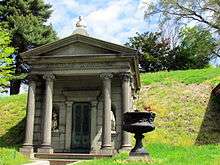Charles Morgan (businessman)
Charles Morgan ( April 21, 1795 – May 8, 1878 ) was a U.S. railroad and shipping magnate. Morgan played a leading role in the development of transportation and commerce in the Southern United States through the mid-to-late 19th century.
Career
Charles Morgan was born in Clinton, Connecticut. At the age of 14 he began working at his uncle's store, and later launched his own import business. As his business grew he invested in a steamship line which traded in the West Indies. By the 1850s Morgan was engaged in the steamship business on a full-time basis. He later began constructing his own ships, and was one of the first ship builders to switch from wood to iron construction.
In the 1850s the New Orleans, Opelousas and Great Western Railroad ( N.O.O. & G.W.R.R. ) began construction in New Orleans. Since New Orleans was a major port for Morgan's steamship company, he saw this new railroad as an opportunity to move his goods to Texas. He invested $2,050,000 in the railroad. During the Civil War much of the railroad's equipment was commandeered by the Confederate forces. Due to economic problems the railroad was sold after the war, and Morgan purchased the entire assets. He later renamed it the Morgan's Louisiana and Texas Railroad and Steamship Company (see Texas and New Orleans Railroad ).

The expansion of the railroad continued westward, reaching Lafayette by 1879. Unfortunately, Morgan died a few weeks before the railroad reached the city. He is interred at Green-Wood Cemetery in Brooklyn, New York. The company continued to operate under the goals that he established, and it was finally acquired by Southern Pacific Railroad in 1885.
It was Morgan & Garrison, the business partnership of Charles Morgan and C.K. Garrison, who were the recipients of the brief and now very famous letter: "Gentlemen: You have undertaken to cheat me. I won't sue you, for the law is too slow. I'll ruin you. Yours truly, Cornelius Vanderbilt."
The Morgan School in Clinton, Connecticut is named after Charles Morgan. Morgan City, Louisiana, is also named in his honor.[1]
References
- ↑ Louisiana Department of Culture, Recreation and Tourism. "Brothers of the Sacred Heart Historical Marker".
Source: Southern Pacific Bulletin - May 1936